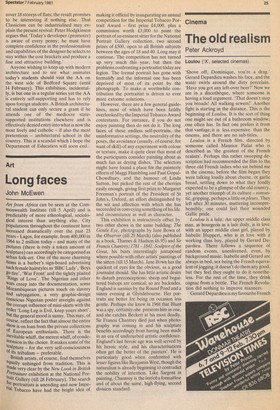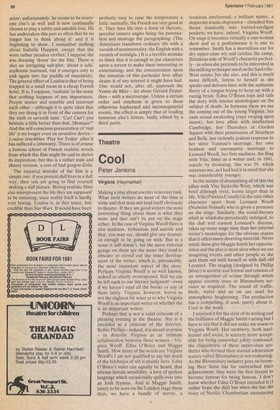Cinema
The old realism
Peter Ackroyd
Loulou ('X', selected cinemas) 'Shove off, Dominique, you're a drag.' Gerard Depardieu washes his face, and the water swirls around the dirty porcelain. 'Have you got any left-over beer?' Now we are in a discotheque, where someone is having a loud argument. 'That doesn't stop you broads! All walking sewers!' Another fight is starting in the distance. This is the beginning of Loulou. It is the sort of thing one might see out of a bathroom window; , one often has. In fact one prefers it from that vantage; it is less expensive than the cinema, and there are no sub-titles. Loulou is a French film, directed by someone called Maurice Pialat who is described as 'the greatest of the French realists'. Perhaps this rather sweeping description had recommended the film to the, three old French ladies who sat behind me in the cinema; before the film began they were talking loudly about cheese, or garlic bread, settling down to what they fondly expected to be a glimpse of the old country, yet another triumph of its culture — romantic, gripping, perhaps a little en pleurs. They left after 30 minutes, muttering incomprehensibly; one could feel their wounded Gallic pride. Loulou is a lulu. An upper middle class man, as bourgeois as a lace doily, is in love with an upper middle class girl, played by Isabelle Huppert, who is in love with a working class boy, played by Gerard Depardieu. There follows a sequence oi random events, unerilivened, even, by background music. Isabelle and Gerard are always in bed, sex being the French equivalent of jogging; it doesn't do them any good, but they feel they ought to do it nonetheless. For the rest of the time, they drink cognac from a bottle. The French Revolution did nothing to improve manners. Gerard Depardieu is my favourite French actor; unfortunately, he seems to be everyone else's as well and is now continually chosen to play a tubby and amiable lout. He has undertaken this part so often that he no longer has to think about it: and it is beginning to show. I remember nothing about Isabelle Huppert, except that she wore rather peculiar clothes; I suppose she was dressing 'down' for the film. There is also an intriguing sub-plot, about a schizophrenic husband, but it emerges only to sink again into the puddle of mundanity. The general effect of Loulou is that of being trapped in a small room in a cheap French hotel. It is, I suppose, 'realistic' in the sense that nothing happens of any importance. People stutter and stumble and interrupt each other — although it is quite clear that they are doing it in front of the camera for the sixth or seventh time. 'Cut! Can't you hesitate a little better than that, Monique?' And the self-conscious presentation of 'real life' is no longer even an inventive device Loulou resembles 'Play for Today' after it has-suffered a lobotomy. There is of course a famous school of French realistic novels from which this film might be said to derive its inspiration; but this is a rather stale and cheesy version, a sort of bad gorgon-Zola.
The essential mistake of the film is a simple one: if you present dull lives in a dull way, then you are going to find yourself making a dull picture. Boring realistic films also misrepresent the life they are supposed to be imitating, since reality itself is hardly ever boring. Loulou is, in that sense, less credible than Star Wars. It would have been perfectly easy to raise the temperature a little: normally, the French are very good at it. They turn life into a form of rhetoric, peculiar camera angles being the punctuation and montage the paragraphing. (The Americans transform ordinary life with a varnish of sentimentality; the English with a varnish of nostalgia.) It is a terrible mistake to think that it is enough to put characters upon a screen to make them interesting or entertaining, and the concentration upon the minutiae of this particular love affair drains it of any interest it might have had. One would not, after all, approach the Venus de Milo — let alone Gerard Depardieu — with a microscope. Unless a certain order and emphasis is given to these otherwise haphazard and inconsequential events, the effect is simply that of reading someone else's letters, badly edited by a third party.







































 Previous page
Previous page